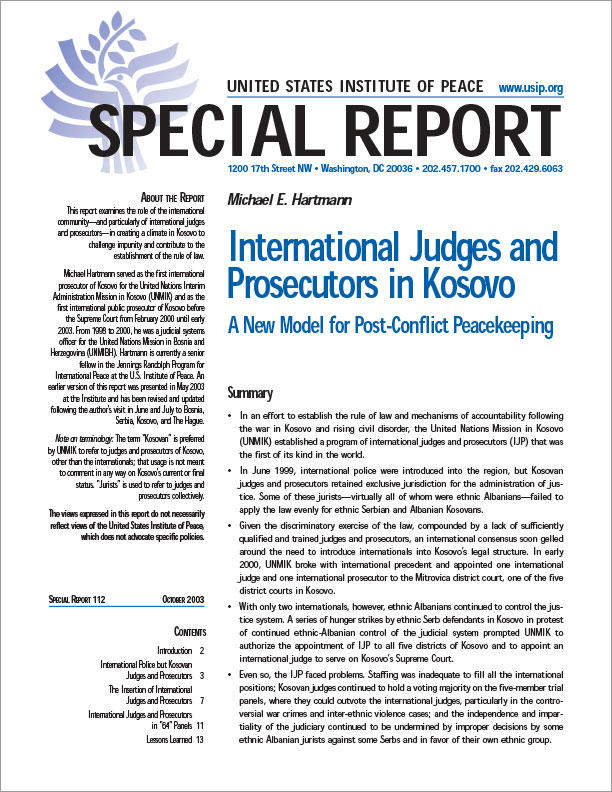This report examines the role of the international community—and particularly of international judges and prosecutors—in creating a climate in Kosovo to challenge impunity and contribute to the establishment of the rule of law.

Summary
- In an effort to establish the rule of law and mechanisms of accountability following the war in Kosovo and rising civil disorder, the United Nations Mission in Kosovo (UNMIK) established a program of international judges and prosecutors (IJP) that was the first of its kind in the world.
- In June 1999, international police were introduced into the region, but Kosovan judges and prosecutors retained exclusive jurisdiction for the administration of justice. Some of these jurists—virtually all of whom were ethnic Albanians—failed to apply the law evenly for ethnic Serbian and Albanian Kosovans.
- Given the discriminatory exercise of the law, compounded by a lack of sufficiently qualified and trained judges and prosecutors, an international consensus soon gelled around the need to introduce internationals into Kosovo's legal structure. In early 2000, UNMIK broke with international precedent and appointed one international judge and one international prosecutor to the Mitrovica district court, one of the five district courts in Kosovo.
- With only two internationals, however, ethnic Albanians continued to control the justice system. A series of hunger strikes by ethnic Serb defendants in Kosovo in protest of continued ethnic-Albanian control of the judicial system prompted UNMIK to authorize the appointment of IJP to all five districts of Kosovo and to appoint an international judge to serve on Kosovo's Supreme Court.
- Even so, the IJP faced problems. Staffing was inadequate to fill all the international positions; Kosovan judges continued to hold a voting majority on the five-member trial panels, where they could outvote the international judges, particularly in the controversial war crimes and inter-ethnic violence cases; and the independence and impartiality of the judiciary continued to be undermined by improper decisions by some ethnic Albanian jurists against some Serbs and in favor of their own ethnic group.
- In response, UNMIK instituted special "64" panels, named after the regulation that created them (2000/64), to ensure that international judges would constitute the majority in designated cases. Furthermore, it instituted rigorous case-monitoring practices and passed an additional regulation (2001/2) that ensured that international prosecutors could resurrect cases that had been abandoned by their Kosovan counterparts.
- Further refinements are still needed concerning a number of outstanding issues—for example, the selection, recruitment, and hiring practices for IJP; terms of IJP mandate, tenure, and dismissal; grievance procedures against IJP; IJP training practices and policies; and the development of more uniform case-selection and charging criteria.
- What has been learned from the international experience in Kosovo, however, is that successful international intervention in the judicial arena should be immediate and bold, rather than incremental and crisis-driven. Early prosecution by internationals can ensure fair and impartial trials and a public perception that even the powerful are not immune to the rule of law, can inhibit the growth and entrenchment of criminal power structures and alliances among extremist ethnic groups, and can end impunity for war criminals and terrorists alike.
About the Report
This report examines the role of the international community—and particularly of international judges and prosecutors—in creating a climate in Kosovo to challenge impunity and contribute to the establishment of the rule of law.
Michael Hartmann served as the first international prosecutor of Kosovo for the United Nations Interim Administration Mission in Kosovo (UNMIK) and as the first international public prosecutor of Kosovo before the Supreme Court from February 2000 until early 2003. From 1998 to 2000, he was a judicial systems officer for the United Nations Mission in Bosnia and Herzegovina (UNMIBH). Hartmann is currently a senior fellow in the Jennings Randolph Program for International Peace at the U.S. Institute of Peace. An earlier version of this report was presented in May 2003 at the Institute and has been revised and updated following the author's visit in June and July to Bosnia, Serbia, Kosovo, and The Hague.
Note on terminology: The term "Kosovan" is preferred by UNMIK to refer to judges and prosecutors of Kosovo, other than the internationals; that usage is not meant to comment in any way on Kosovo's current or final status. "Jurists" is used to refer to judges and prosecutors collectively.
The views expressed in this report do not necessarily reflect views of the United States Institute of Peace, which does not advocate specific policies.